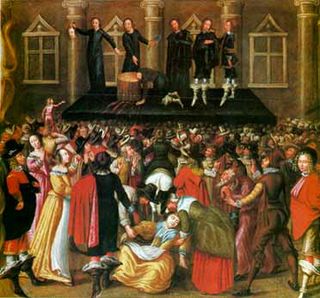
Opening:
Please take a moment to review the Georgia Performance Standards, Essential Questions, and Key Terms:
Georgia Performance Standards:
ELABLRL1.1.f: The student races the development of British fiction through various literary periods (i.e., Anglo-Saxon, Medieval, Renaissance, Romantic, etc.)
ELABLRL3.1.b.iv The student relates a literary work to the characteristics of the literary time period that it represents -- 18th Century/Restoration/Neo-Classical Period
Essential Questions:
1. In what ways does the literature of the Restoration and the Enlightenment reflect the shift in what people felt was important?
2. Why is this era sometimes called "The Age of Reason"?
Key Terms:
Satire
Rationalism
Mini-Lesson:
The Renaissance was already over for the most part when King James I died in 1625, and his son Charles I took the throne. Charles was a terrible ruler, more like an invisible dictator than a king. By 1649, people were fed up with Charles, and during this year some the most powerful people in the kingdom had him beheaded. For the next eleven years England was ruled by the Parliment while the heir to the throne, Charles II was hiding in France.
In 1660, Charles II returned to the throne, which began a period of more normal and steady life for the English. In the time between the death of James I and the restoration of the crown, England was devistated by plague, damaged by a fire that left two thirds of London homeless, and had been in the grips of a civil war for twenty years. The country was exhausted. This new period which lasted until arounf 1800 is known as the Restoration -- a period when
 people continued their quest for higher learning, art and philosophy.
people continued their quest for higher learning, art and philosophy.Many people call this period "The Age of Reason" because many people began to turn to science to explain the mysteries of the universe that were precviously explained through religion. For those of you who remember the Rationalists from American literature, these periods were very similiar. Instead of asking why things happend, people started investigating how they happened. This included everything from astronomy to biology to physics. A philosophy called Deism. in which people believed God built the universe and then left it alone for people to run became more popular.
English writing went through a transformation as well. Instead of the flowery poetry of Shakespeare and his contemporaries, English writers began to adopt prose (prose = not poetry), a much simpler and planer form that was accessable to more people. New forms of writing like diaries, journals, newspapers, magazines, and novels became much more popular. This may also be due to the Puritans being successful in closing the theaters since they found them immoral. English drama would never return to the status it held in Shakespeare's day.
Work Period:
Please post the following to your blog:
1. Research The Glorious Revolution (sometimes called the Bloodless Revolution) online or in one of the textbooks. Write a paragraph summarizing what happened, and then another that explains why you think the event was so important.
2. Define "satire". Don't just copy and paste a definition from another source. Read the definition, and then explain it in your own words. Once you have done that, provide a few modern-day examples of satire (television shows, movies, magazines, etc.).
3. Read "A Modest Proposal", which may be difficult at first, but if you stick with it, the message will become more clear. Once you are finished reading, you should write a short response to what you read (4-5 sentences), and explain how this is a work of satire. Be sure you can identify the social problem he is addressing in the piece.
4. Read either "from the Diary of Samuel Pepys" or "from A Journal of the Plague Year" by Daniel Defoe, both of which can be found in the purple anthology. Once you have finished reading, write a 1-2 paragraph response to what you have read. Please be sure to include some direct evidence from the text to help show what you are responding to.
Closing:
Review the Georgia Performance Standards, Essential Questions, and Key Terms before moving onto the questions below. It would also be helpful to review the responses you made to the opening question.
5. What do you think was most important to people living in this time? Write a 1-2 paragraph response to this question in which you use direct evidence from the texts you read to support whatever arguments you make.
6. Evaluate the work you have completed thus far. Explain to me, using direct examples from your work, how you have addressed the Georgia Performance Standards posted above. You may also choose to explain how you have acquired answers to the essential questions.
Once you have completed everything above, leave me a comment so I can check your work.

1 comment:
Unit 5 is done!!!!
Post a Comment